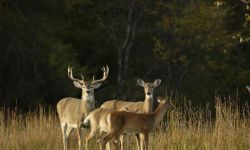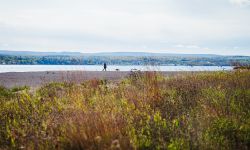Opinion | The case for adding 51K acres of wilderness in Upper Peninsula
Michigan is home to some of the most exceptional wild lands in the country. We are blessed with 19 million acres of forest, over 11,000 lakes and more than 50,000 miles of rivers.

The citizens of Michigan have always been passionate about protecting these resources. We have a state park system second to none, with 77 state parks. We also have almost 500 miles of designated wild and scenic River, two national lakeshores, and one national park.
Michigan is also home to 16 federally designated wilderness areas. Wilderness areas are designated on lands owned by the federal government, and can be found in national forests, national parks and lakeshores, and national wildlife areas.
Wilderness areas are defined by the 1964 Wilderness Act as “an area where the earth and its community of life are untrammeled by man, where man himself is a visitor who does not remain.” The act's purpose is to preserve and protect the natural ecosystems and wild areas and also to provide opportunities for solitude and retrospective or primitive recreation.
We now have an opportunity to add to the federal wilderness system in Michigan. Sierra Club is part of a campaign to designate three new wilderness areas and add to an existing wilderness. This campaign, supported by a wide array of over 400 environmental groups, businesses, faith-based groups and others, would add almost 51,000 acres to the already designated wilderness in Michigan.
The proposed new wilderness is all in the Ottawa National Forest, in the western Upper Peninsula. They are the Trap Hills area, Ehlco, the Norwich Plains and an addition to the existing Sturgeon River Gorge. The first 3 would create a nearly contiguous wilderness of almost 40,000 acres, and would be adjacent to the Porcupine Mountains State Park.
These areas contain rare plants and animals, such as lichens and ferns found in very few places. There are also unique landscapes, including the highest sheer cliff in Michigan.
We are encouraging Michigan Sen. Debbie Stabenow to include this wilderness proposal in the 2023 farm bill, which will be up for consideration this fall. Senator Stabenow is in a unique position to advance this proposal. Not only is she from Michigan, but she also chairs the Senate Agriculture Committee, which has jurisdiction over National Forests.
Why is designation of new Wilderness important? Wilderness protects vegetation, wildlife, and biodiversity. By minimizing human disturbance, wilderness creates resilience against climate change. It also creates “reference areas”, against which the health of the rest of the forest can be measured.
Wilderness designation creates areas of solitude, where people can recreate without disturbance, in the quiet of the natural sounds of birds, rivers, and the whisper of the trees in the wind. Visitors can leave the mechanized sounds of more crowded areas behind.
This experience of quiet and solitude is also economically beneficial to the local economy. Designated Wilderness attracts visitors who seek the experience of nature “untrammeled by man”, as described in the Wilderness Act. Wilderness acts as a magnet.
This became clear during the pandemic. As people fled to natural areas to recreate during the COVID crisis, the number of visitors seeking wild places increased dramatically.
I have spent significant amounts of my time in Wilderness Areas, everywhere from Isle Royale National Park to the Sylvania Wilderness in the far west U.P., to Nordhouse Dunes, in the western lower peninsula and easily accessible to many of Michigan’s major metropolitan centers.
To be fair, there are some who object to wilderness. Some of these objections are based upon misunderstandings of what wilderness designation would do.
Some people object to any more public land in the U.P., and they feel that more public land would stifle development. However, wilderness designation would all occur on lands which are in the Ottawa National Forest. The areas are already in federal ownership, and no new public lands would be acquired.
Some fear that popular activities such as hunting, fishing, and camping would be restricted. In fact, Wilderness designation would not prohibit, or reduce, hunting, fishing and camping. All of those activities would remain allowed as they are today.
Wilderness would prohibit “mechanized use”. This includes motorized vehicles, including ATVs, motor boats, and cars and trucks. However, the amount of land which would restrict mechanized use is very small, compared to the amount which will remain open.
The proposal is to designate approximately 51,000 acres of new wilderness. This is less than 3 percent of the Ottawa National Forest, most of which is open to motorized use.
We encourage Senator Stabenow to enthusiastically promote this proposal, and include it in the 2023 farm bill.
For more information, visit Keep The UP Wild.
See what new members are saying about why they donated to Bridge Michigan:
- “In order for this information to be accurate and unbiased it must be underwritten by its readers, not by special interests.” - Larry S.
- “Not many other media sources report on the topics Bridge does.” - Susan B.
- “Your journalism is outstanding and rare these days.” - Mark S.
If you want to ensure the future of nonpartisan, nonprofit Michigan journalism, please become a member today. You, too, will be asked why you donated and maybe we'll feature your quote next time!




